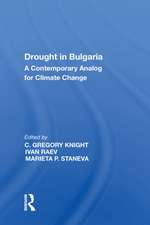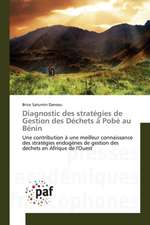Environmental Publics
Autor Sally Edenen Limba Engleză Hardback – 12 dec 2016
Emphasising the practices of ‘environmental engagement’, Environmental Publics examines how people consume the environment, learn about it, campaign for its protection and enjoy it through their leisure time. But the book avoids relying on idealisations of ‘consumers’ or ‘citizens’, or theoretical constructs about behavioural norms that have traditionally dominated research in this field. Instead, this book differentiates environmental publics not by who they are but by what they are doing – their daily practices. It also analyses specifically the geographies of those practices – how what people do affects the environment but in different ways across time and space and at different scales – aspects of practices that are neglected in the literature.
With an interdisciplinary perspective, this book will be of interest to students and scholars in geography, sociology, science and technology studies, political science and anthropology. It is written in an accessible and readable style, so as to be useful for preliminary and more advanced courses in environmental management, perception and policy, as well as in studies of modern society, consumption and environmentalism.
| Toate formatele și edițiile | Preț | Express |
|---|---|---|
| Paperback (1) | 309.58 lei 6-8 săpt. | |
| Taylor & Francis – 5 dec 2016 | 309.58 lei 6-8 săpt. | |
| Hardback (1) | 819.09 lei 6-8 săpt. | |
| Taylor & Francis – 12 dec 2016 | 819.09 lei 6-8 săpt. |
Preț: 819.09 lei
Preț vechi: 1102.30 lei
-26% Nou
Puncte Express: 1229
Preț estimativ în valută:
156.75€ • 163.44$ • 130.27£
156.75€ • 163.44$ • 130.27£
Carte tipărită la comandă
Livrare economică 20 martie-03 aprilie
Preluare comenzi: 021 569.72.76
Specificații
ISBN-13: 9781138189409
ISBN-10: 1138189405
Pagini: 206
Ilustrații: 38
Dimensiuni: 156 x 234 mm
Greutate: 0.41 kg
Ediția:1
Editura: Taylor & Francis
Colecția Routledge
Locul publicării:Oxford, United Kingdom
ISBN-10: 1138189405
Pagini: 206
Ilustrații: 38
Dimensiuni: 156 x 234 mm
Greutate: 0.41 kg
Ediția:1
Editura: Taylor & Francis
Colecția Routledge
Locul publicării:Oxford, United Kingdom
Public țintă
Postgraduate and UndergraduateCuprins
List of figuresList of tables
Acknowledgements
1 Differentiating environmental publics
Introduction
Publics in environmental practice
Practices and power in place
Disciplinary differences
The structure of this book
References
2 Knowing publics
Introduction
Knowledge-practices
Place and scale in knowledge-practices
Power
Summing up
Notes
References
3 Participating publics
Introduction
Practices
Place
Power
Summing up
References
4 Consuming publics
Introduction
Practices
Place
Power
Summing up
Notes
References
5 Enjoying publics
Introduction
Practices of environmental recreation
Learning and sharing environmental recreational practices
Moralising practices of environmental recreation
Place
Power
Summing up
Note
References
6 Campaigning publics
Introduction
Practices
Place
Power
Summary
Notes
References
7 Voting publics
Introduction
Place
Power
Summing up
Notes
References
8 Working publics
Introduction
Practices
Place
Power
Summing up
Notes
References
9 Conclusions
Introduction
Linking practices
Geographies of environmental publics
Material and virtual publics
Changing practices
Summing up
References
Index
Acknowledgements
1 Differentiating environmental publics
Introduction
Publics in environmental practice
Practices and power in place
Disciplinary differences
The structure of this book
References
2 Knowing publics
Introduction
Knowledge-practices
Place and scale in knowledge-practices
Power
Summing up
Notes
References
3 Participating publics
Introduction
Practices
Place
Power
Summing up
References
4 Consuming publics
Introduction
Practices
Place
Power
Summing up
Notes
References
5 Enjoying publics
Introduction
Practices of environmental recreation
Learning and sharing environmental recreational practices
Moralising practices of environmental recreation
Place
Power
Summing up
Note
References
6 Campaigning publics
Introduction
Practices
Place
Power
Summary
Notes
References
7 Voting publics
Introduction
Place
Power
Summing up
Notes
References
8 Working publics
Introduction
Practices
Place
Power
Summing up
Notes
References
9 Conclusions
Introduction
Linking practices
Geographies of environmental publics
Material and virtual publics
Changing practices
Summing up
References
Index
Notă biografică
Sally Eden was a professor in the Department of Geography, Environment and Earth Sciences at the University of Hull, UK. She spent twenty years researching how people relate to the environment through consumption, leisure, knowledge and policy.
Recenzii
'The public’ is not one thing and their engagements with the environment take multiple forms. This book brilliantly takes these simple ideas into a fascinating account of how environmental publics know, participate, consume, enjoy, campaign, vote and work. Drawing together 20 years of her top quality research, readers of this book will have the privilege of immersing themselves in Sally Eden’s incisive analysis and accessible theorisation of what ‘environmental engagements’ can be taken to mean.'
Professor Gordon Walker, Lancaster Environment Centre and DEMAND Centre, Lancaster University, UK
'Through Environmental Publics, Sally Eden has cemented her position as one of the pre-eminent writers on environmental geography. Brilliantly drawing together a diverse wealth of original empirical material, she compellingly argues that studies of environmental engagement should refocus on the multiple publics that form around everyday practices. Conceptually original and insightful, the book is engagingly written and should be essential reading for anyone interested in producing better environmental futures.'
Dr Christopher Bear, Senior Lecturer in Human Geography, Cardiff University, UK.
Eden’s book, published posthumously after her passing last year, cannot help but take more than a
tinge of sadness as a result; even for those, like me, who never had the chance to meet her. Environmental
Publics is a suitable and substantial cap to an academic career – overarching, drawing in a
variety of themes and research projects; elegant, carefully and clearly setting out arguments and
gathering this array of details; and accessible, well-written, engaging and simply gathering theory
and empirical evidence to make her points.
Gerald Taylor Aiken, Local Environment Journal, The International Journal of Justice and Sustainability
Professor Gordon Walker, Lancaster Environment Centre and DEMAND Centre, Lancaster University, UK
'Through Environmental Publics, Sally Eden has cemented her position as one of the pre-eminent writers on environmental geography. Brilliantly drawing together a diverse wealth of original empirical material, she compellingly argues that studies of environmental engagement should refocus on the multiple publics that form around everyday practices. Conceptually original and insightful, the book is engagingly written and should be essential reading for anyone interested in producing better environmental futures.'
Dr Christopher Bear, Senior Lecturer in Human Geography, Cardiff University, UK.
Eden’s book, published posthumously after her passing last year, cannot help but take more than a
tinge of sadness as a result; even for those, like me, who never had the chance to meet her. Environmental
Publics is a suitable and substantial cap to an academic career – overarching, drawing in a
variety of themes and research projects; elegant, carefully and clearly setting out arguments and
gathering this array of details; and accessible, well-written, engaging and simply gathering theory
and empirical evidence to make her points.
Gerald Taylor Aiken, Local Environment Journal, The International Journal of Justice and Sustainability
Descriere
Emphasising the practices of ‘environmental engagement’, Environmental Publics examines how people consume the environment, learn about it, campaign for its protection and enjoy it through their leisure time. It differentiates environmental publics not by who they are but by what they doing – their daily practices and analyses specifically the geographies of those practices, that is, how what people do affects the environment but in different ways across time and space and at different scales. With an interdisciplinary perspective, this book will be of interest to students and scholars in geography, sociology, science and technology studies, political science and anthropology.






















